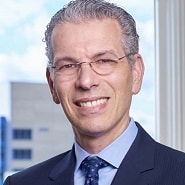
David Feinberg, MD, President & CEO, Geisinger
I share patient letters with our leadership team at every meeting. Some are good, with grateful stories of lifesaving interventions and above-and-beyond care. Some are not good, letting us know where we fell short and need to improve.
At our most recent forum, I shared a letter that was a mix of both good and bad. A same-sex couple told us about their experience as the adoptive parents of a baby boy born at one of our hospitals. Their infant son needed care in the neonatal intensive care unit. They praised his care and the compassionate support they received as new parents of a preemie.
But the couple noticed that the birth mom may not have been shown the same respect and compassion while she was a patient. The couple perceived an awkwardness from staff based on her socio-economic status and the circumstances that may have led to her placing a child for adoption. The couple was also questioned about their choice for open adoption, which they felt may have been due to a lack of understanding. These new parents recommended more education for our staff about open adoptions.
Our leaders are taking swift action to develop training so that this particular situation never happens to another birth mom or adoptive family in our care.
The broader issue for us was: How do we equip everyone at Geisinger to deal with situations outside of their personal experiences? The world is evolving, and we can find ourselves in uncharted territory and wondering what to do.
I asked the managers to remind our folks that when you’re not sure what to do, lead with kindness. Kindness is one of Geisinger’s core values. We strive to treat everyone as we would hope to be treated ourselves. It’s the best way to handle ourselves, to make the right choice and provide the right care, no matter what.
We have no room for bias in healthcare, whether it’s based on a patient’s socioeconomic status, background, sexual orientation or the choices they have made. We have to examine ourselves and be aware of what may trigger feelings that would lead us to, even unconsciously, treat a patient without the compassion, respect and dignity they deserve.
Kindness can get you through any situation — as unfamiliar it may seem or unsure you may feel. For example, if a transgender patient wants to be called by a different name than the one on their medical record, what do you do? With kindness, ask them what they prefer to be called. A front desk clerk in a physician office may not have read the latest medical study on how traumatic it is for a transgender person to be called by a previous name, but simple kindness and consideration can lead to the best action. With kindness at our core, we can always treat our patients and each other with respect and dignity.
We’ve initiated a kindness project at Geisinger. Our first step was gathering thousands of signatures and notes of gratitude and thanks from our employees to share with the patients and communities we serve. We also created a series of videos featuring the acts of kindness that members of the Geisinger family carry out for each other and their patients each day.
The world is changing fast, but if we move toward acceptance and inclusion and compassion, we won’t be left behind.
This piece was originally published on LinkedIn by David Feinberg, MD, President and CEO of Geisinger, an integrated health system based in Danville, Pa., that includes 13 hospital campuses, two research centers, the Geisinger Commonwealth School of Medicine, and a health plan.


Share Your Thoughts
You must be logged in to post a comment.